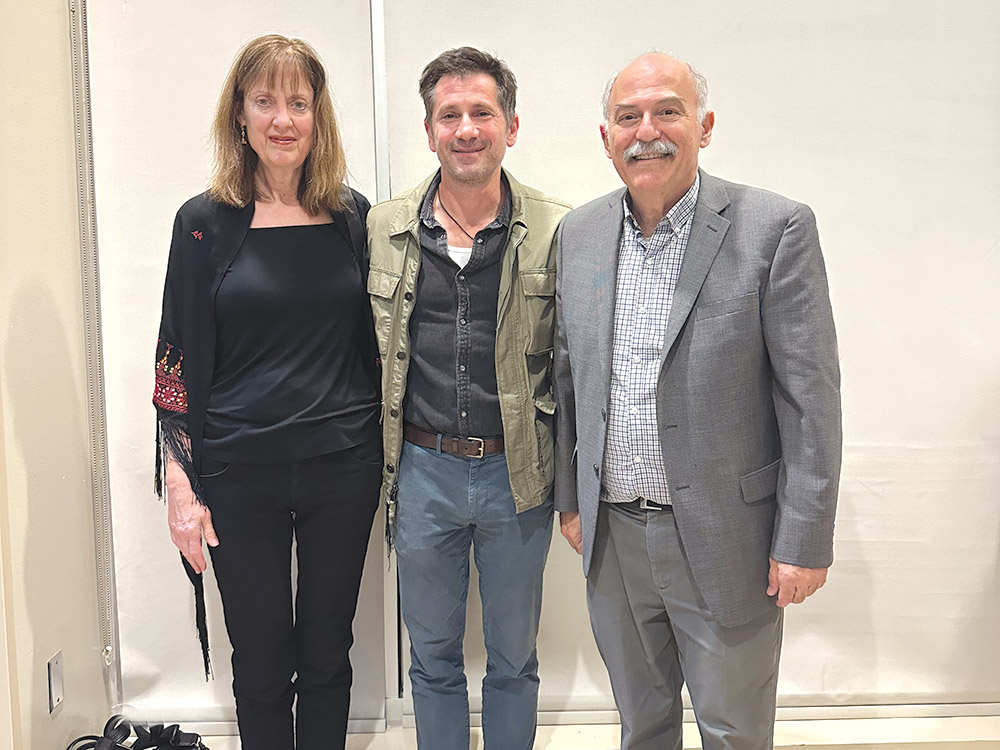
Left to right: Dr. Mary Husain, Michael Goorjian, and Prof. Barlow Der Mugrdechian.
Ani Sargsyan
Staff Writer
“We have a lot of films that amplify what is bad about humanity, and to me the concept of someone watching somebody else and starting to care about them…that’s human nature, and an idea that is important to reflect in film,” said Michael A. Goorjian, director of “Amerikatsi.”
On Friday, April 26, 2024, the Armenian Studies Program, in collaboration with Fresno State’s CineCulture, welcomed director Michael A. Goorjian as a discussant for his movie “Amerikatsi.” The film screened before an audience of nearly three hundred in the Leon S. and Pete P. Peters Educational Center. Following the screening, the auditorium was filled with enthusiastic applause as the audience appreciated the film and Goorjian’s directorial skills.
CineCulture Prof. Mary Husain introduced the film and then introduced Prof. Barlow Der Mugrdechian of the Armenian Studies Program. Prof. Der Mugrdechian spoke about the many years of collaboration between CineCulture and the Armenian Studies Program in bringing a variety of interesting Armenian-themed films to campus.
Goorjian is a filmmaker, writer, and actor, who won an Emmy award for Outstanding Supporting Actor in his role as David Goodson in the film “David’s Mother,” and is known for his role as Justin, in the TV series “Party of Five.” His directorial debut, “Illusion,” achieved recognition and praise, as he wrote, directed and starred alongside Kirk Douglas.
The film, “Amerikatsi,” takes place in Soviet Armenia and centers around an Armenian-American repatriate, Charlie, who seeks to learn about his homeland, after fleeing the Armenian Genocide as a boy. One of the only things he remembers from his childhood is the melody of a song, which he hopes will lead to some answers. Upon arriving in Soviet Armenia, Charlie is misunderstood to be an American spy and sent to prison. The survival of Charlie’s spirit and hope depends on the lives of a near-by Armenian couple. The cell that Charlie stays in has a window through which he can look out into a home on the other side of the stone wall. He becomes invested in the lives of Tigran, an Armenian guard and former painter, and his wife.
By watching this Armenian couple’s lives, Charlie gleans a better understanding of his homeland and himself. The film beautifully blends emotions: sarcasm, irony, humor, sadness, pain, happiness, relief, hope and love.
In the discussion following the screening, Goorjian mentioned some movies that influenced the making of his film. One of the movies, called “The Lives of Others,” is directed by Florian Henckel von Donnersmarck, a German film who depicts the life of a man who began to care for a person he was supposed to be informing on. Goorjian used this idea in his film to show the more tender and soft side of people.
Another story that influenced the film, “Amerikatsi,” was told by his friend, who knew someone imprisoned in a prison in Kyiv. This prisoner’s life mimicked that of Charlie’s in the sense that he could see into a near-by apartment from his cell.
The idea that people can start to care for those they don’t even know, was something that really stuck with Goorjian when creating this film.
“I wanted to write something that was not about the Genocide,” said Goorjian, “but about some-thing hopeful.” He wanted the film to be accessible to non-Armenians, and said that one of the film’s biggest successes was the response from non-Armenians.
Goorjian also wanted to show a different side of Armenian history, that not everyone was as well informed on. His nuanced layers in the film allowed the viewer to take a new perspective every time they watch.
 Hye Sharzhoom Armenian Action
Hye Sharzhoom Armenian Action